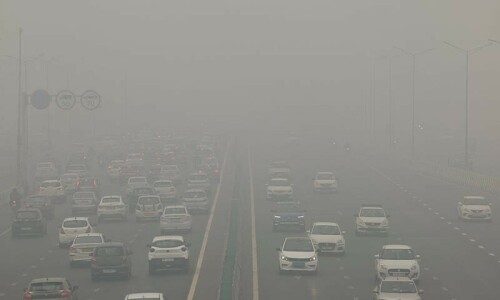ISLAMABAD: Amid countrywide protests over high electricity prices, the Power Division has virtually bombarded the power regulator with three separate sets of quarterly adjustments for K-Electric to clear the backlog for uniformity with consumers of ex-Wapda Distribution Companies (Discos), for simultaneous and overlapping application of 47 paise, Rs1.49-Rs4.45 and Rs3.55 per unit additional charges.
The petitions filed before the National Electric Power Regulatory Authority (Nepra) apparently without approval of the federal cabinet seek the application of the first 47 paise per unit quarterly tariff adjustment (QTA) in the billing months of Sept, Oct, and Nov 2023, followed by Rs1.49-4.45 per unit (depending on various categories) application also in Sept and Oct 2023 and then Rs3.55 per unit charge in six months of Sept 2023 to March 2024.
Barring the Rs3.55 per unit increase pending before Nepra, all these charges have already been collected or approved for collection from consumers of Discos but could not be applied to K-Electric because of legal questions. Now, the power division has asked Nepra to ensure the application of Discos’ quarterly adjustments to KE for uniformity across the country.
Nepra had previously refrained from allowing these charges on technical and legal grounds on different occasions but has again called a public hearing on Sept 11 to examine the revised petitions in the light of public comments from various stakeholders and consumer groups.
Nepra said the power division had once again “requested to apply periodic adjustments for the second quarter of FY23 for Discos of Rs0.4689/kwh on the consumers of KE to maintain uniform tariff across the country” on the consumption of April, May, and June 2023 with prospective recovery in Sept to Nov 2023.
Secondly, it said the power division had also “submitted policy guidelines for uniform application of quarterly adjustments on Discos and KE consumers” and thus tariff rationalisation of “Rs1.4874 to Rs4.4547/kwh for different consumer categories” be charged in Sept and Oct. Thirdly, the Ministry of Energy (Power Division) has also demanded that fourth quarterly adjustment for Discos for which public hearing was held on Aug 23 should also be applied to KE consumers as well in the light of policy guidelines.
Interestingly, the Power Division’s request to the regulator displayed by Nepra on its website, said the Economic Coordination Committee (ECC) had approved the policy guidelines on Aug 7 for simultaneous application of Discos’ quarterly adjustments to KE as well for uniformity.
During the public hearing on Aug 23, Nepra members, particularly Member Legal Amina Ahmad, had pointed out that the policy guideline presented to her contained the approval of only the Economic Coordination Committee (ECC) of the cabinet and not the federal cabinet.
The Power Division’s team had, however, insisted the federal cabinet had ratified the ECC decision and had promised to provide its documentary evidence. As a result, Nepra had not taken an immediate decision on both requests — staggered QTA recovery in six months and its simultaneously application for KE — and promised to examine them in the light of written requests, record, and relevant legal instruments.
The Power Division had sought the staggered imposition of Rs146bn quarterly charges in six months, instead of three months to minimise the ‘price shock’ for Discos consumers and proposed that instead of Rs5.40 per unit additional recovery from consumers in three months, the same amount could be allowed to be charged at a rate of Rs3.55 per unit for six months.
Earlier on May 23, Nepra had rejected, with a majority vote on technical grounds rather than on its merits, the federal government’s request to increase the electricity tariff for K-Electric’s consumers by an average Rs3.5 per unit for three months to reduce government subsidies by Rs20bn. This meant Rs1.49 per unit increase for consumers using up to 300 units per months (except those under 100 units) followed by Rs3.21 per unit for above 301 units in domestic categories and Rs4.45 per unit in all other categories including commercial, industrial etc.
Three provincial members — Sindh, Khyber Pakhtunkhwa, and Punjab — had rejected the request for tariff increase for the first quarter (July-Sept 2023) saying this did not appear to be for the purpose of national uniformity of electricity rates and was also not covered under the existing legal framework and policy guidelines of the government. But they had added that the request could be entertained once fresh tariff guidelines were issued by the government.
The then Nepra chairman had put the responsibility on the federal government saying the regulator also “need clear guidelines from the GOP for considering such request”.
The Power Division is of the view that under the National Electricity Policy 2021, it had to maintain a uniform consumer-end tariff for K-Electric and state-owned Discos (even after privatisation) through incorporation of direct/indirect subsidies. Accordingly, KE applicable uniform variable charge is also required to be modified so as to recover the revenue requirements of KE, determined by the regulator consistent with the uniform national tariff of Discos, which had already been approved by the federal cabinet.
Published in Dawn, September 5th, 2023















































Dear visitor, the comments section is undergoing an overhaul and will return soon.